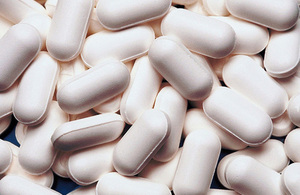Drug driving guidance issued to healthcare professionals
Drug driving guidance to help healthcare professionals explain new laws.

Tough new measures to crack down on the menace of drug driving moved a step closer today (3 July 2014) after the government issued new guidance to healthcare professionals. The new offence of driving with certain controlled drugs, including some prescription drugs, above specified limits is due to come into force 2 March 2015.
The guidance helps doctors and nurses start explaining the new rules in advance of the launch to reassure those patients who take prescription drugs that they will be able to drive safely without fear of being prosecuted.
The new advice, which has been developed with support from the medical profession, advises general practitioners, doctors, nurses and health advisers on changes to the drug driving offence and what it means for patients.
Police can already arrest and charge drivers if they are driving whilst impaired by drugs, including medicinal drugs. The new rules will mean it will be an offence to be over the specified limits for each drug whilst driving, as it is with drink driving. The limits for the vast majority of medicinal drugs are above the normal doses. Unlike the existing ‘impairment’ offence, the new law provides a medical defence for patients who are taking their medicine in accordance with instructions – either from a healthcare professional or printed in the accompanying leaflet – provided they are not impaired.
The guidance also advises patients who take legitimately supplied medicines to keep evidence with them in case they are stopped by police. This will help speed up any investigation into the medical defence and reduce the inconvenience to the patient.
The new regulations will come in to force at the same time as new equipment to test drivers for cannabis and cocaine at the roadside is expected to become available to the police. If a driver tests positive they will be taken to a police station where a further evidential test will be taken. If this is positive it will allow police to arrest and charge a driver for being over the limit.
Roads Minister Robert Goodwill said:
The new guidance will help doctors, nurses and healthcare professionals explain the new drug driving offence and reassure their patients that provided they take their medication in accordance with advice and are not impaired they can carry on driving just as they have always done.
The new drug driving law will make it easier for the police to tackle those who drive after taking illegal drugs or abuse medicinal drugs whether they are on prescription or available over the counter.
This new offence will be introduced alongside major changes to drink-drive laws. Taken together, these will give police the tools they need to prosecute those who risk the lives of others through dangerous behaviour and make our roads safer.
The limits for each individual drug were set out in this announcement on drug driving in 2014. The drugs most associated with medical use have been set at a level where a road safety risk arises, following advice from a panel of medical and scientific experts.
The changes to drink drive are being introduced as part of the Deregulation Bill and will remove the right for drivers who fail a roadside breath test to demand a blood or urine sample at the police station. This test can take place several hours later, which means some drivers who were over the limit when tested at the roadside could have time to sober up. Removing the option for this test will save police forces an estimated £13 million over 10 years and allow breath tests to be used as evidence. New mobile breath testing equipment is also expected to be approved early in 2015, allowing police to take evidential breath tests at the roadside, helping to streamline enforcement and support police officers in making sure our roads are kept safe and free from drink and drug drivers.
Related information
Further drug driving information is available on the THINK! website.
Roads media enquiries
Media enquiries 0300 7777 878
Switchboard 0300 330 3000